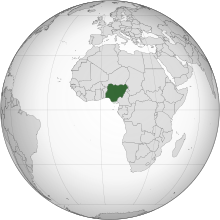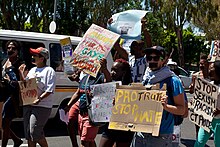
Back معاملة المثليين في نيجيريا Arabic Drets del col·lectiu LGBT a Nigèria Catalan LGBT práva v Nigérii Czech Homosexualität in Nigeria German Δικαιώματα ΛΟΑΤ στη Νιγηρία Greek Diversidad sexual en Nigeria Spanish Droits LGBT au Nigeria French Hakkokin LGBT a Najeriya Hausa זכויות להט"ב בניגריה HE Hak LGBT di Nigeria ID
This article contains too many or overly lengthy quotations. (December 2018) |
LGBT rights in Nigeria | |
|---|---|
 | |
| Status | Illegal since 1904 (Northern Region only; as Northern Nigeria Protectorate)[1]: 34 Illegal since 1916 (Region-wide; as Colony and Protectorate of Nigeria)[1]: 34 |
| Penalty | Up to 16 years imprisonment Life imprisonment according to federal law States under Shari'a law: Death (Applies to persons who have consented to jurisdiction of Shari'a courts plus all Muslims) |
| Gender identity | No |
| Military | No |
| Discrimination protections | No |
| Family rights | |
| Recognition of relationships | No recognition of same-sex unions |
| Restrictions | "The Same-Sex Marriage Prohibition Act" criminalises all forms of same-sex unions |
| Adoption | No |

Lesbian, gay, bisexual, and transgender (LGBT) people in Nigeria face severe challenges not experienced by non-LGBT residents. LGBT rights are generally infringed upon; both male and female expressions of homosexuality are illegal in Nigeria and punishable by up to 16 years of prison in the conventional court system.[2] There is no legal protection for LGBT rights in Nigeria—a largely conservative country of more than 225 million people,[3] split between a mainly Muslim north and a largely Christian south. Very few LGBT persons are open about their sexual orientation, as violence against them is frequent. According to PinkNews, Nigerian authorities generally target the LGBT community.[4] Many LGBT Nigerians are fleeing to countries with progressive law to seek protection.[5]
Attempted same-sex marriages have also been criminalised within Nigeria since 2013. The maximum punishment in the 12 northern states that have adopted Shari'a law is death by stoning. That law applies to all Muslims and to those who have voluntarily consented to application of the Shari'a courts. In southern Nigeria and under the secular criminal laws of northern Nigeria, the maximum punishment for same-sex sexual activity is 16 years' imprisonment.
According to the 2007 Pew Global Attitudes Project, 97%[6] of Nigerian residents believe that homosexuality is a way of life that society should not accept, which was the second-highest rate of non-acceptance in the 45 countries surveyed.[7] In 2015, a survey by an organisation founded by a Nigerian homosexual activist based in London claimed this percentage decreased to 94%. In this survey by Bisi Alimi, as of the same period the percentage of Nigerians who agree LGBT persons should receive education, healthcare, and housing is 30%.[8] The level of disapproval declined slightly to 91% in another Pew Research Center poll in 2019.[9]
- ^ a b Han, Enze (3 May 2018). British Colonialism and the Criminalization of Homosexuality. Routledge. ISBN 9781351256186.
- ^ Bourbeau, Heather (December 2019). "Human Rights". Shari'ah Criminal Law in Northern Nigeria: 39. Archived from the original on 4 April 2022. Retrieved 24 March 2022 – via justice.gov.
- ^ "The World Factbook – Central Intelligence Agency". www.cia.gov. 20 October 2022.
- ^ Condon, Ali. "Nigeria: Mass LGBTQ+ arrests 'based on assumptions, not investigation', activists say". PinkNews. Retrieved 1 November 2023.
- ^ Tayo, Ayomide O. "From near death to detention in USA, this is the story of LGBTQ+ activist Edafe Okporo". Retrieved 29 November 2018.
- ^ The number of adults (all were at least 18 years of age) surveyed in Nigeria was 1,128, yielding a margin of error of 3 percent with a 95 percent confidence level.
- ^ ""Pew Global Attitudes Project", (pages 35, 83, and 117)" (PDF). Archived from the original (PDF) on 14 February 2010. Retrieved 3 December 2009.
- ^ Alimi, Adebisi. "Why My Mom Didn't Say 'I Love You' For 11 Years." National Public Radio. 19 July 2015. Retrieved on 21 July 2015.
- ^ ""The Global Divide on Homosexuality Persists"". 25 June 2020. Archived from the original on 1 July 2022. Retrieved 3 July 2022.
© MMXXIII Rich X Search. We shall prevail. All rights reserved. Rich X Search